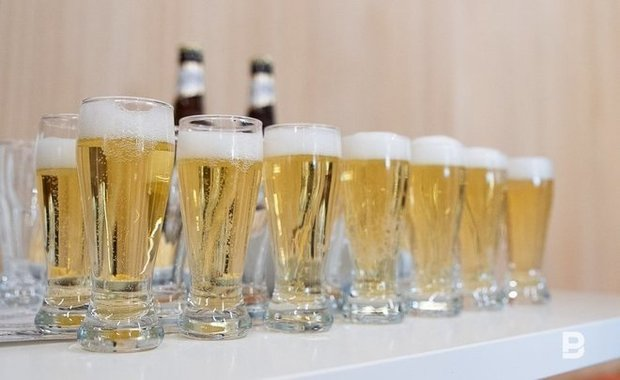‘The Russian Ministry of Industry and Trade has repeatedly offered to complete the republican experiment’
Denis Manturov’s ministry thinks it is necessary to avoid duplication of beer labelling to reduce businesses’ expenses
The federal authorities insist on premature completion of a republican experiment of beer keg labelling, which has been done in the republic since 2020. The Russian Ministry of Industry and Trade claimed this stressing the necessity of duplication of data with the Fair Mark national tracking system. Director of CIFRRA Federal and Regional Alcohol Market Research Centre Vadim Drobiz considers that there is more politics in this game than economy because labelling will not provide beer sales growth, since Tatarstan already rules the alcohol market with a rod of iron not allowing illegal circulation inside the republic.
The Russian Ministry of Industry and Trade asked Tatarstan to stop the experiment
The Russian Ministry of Industry and Trade voiced the official stance on the situation with double beer keg labelling in Tatarstan, which can coincide with the start of a federal pilot project on 1 April 2023. The ministry answered Realnoe Vremya’s question about the unclear situation of beer producers in the republic. Unlike most regions of the country, players of the alcohol market in Tatarstan will have to pay for beer keg labelling twice — first 50 kopeks for every vessel for the republican label National Mark, then for the Data Matrix digital code, which causes a mixed reaction of businesses.
“Indeed, the federal and republican experiments pursue similar goals and envisage voluntary participation. However, manufacturers of beer and low-alcohol products note the difficulty with participating in two experiments at once,” the Russian Ministry of Industry and Trade told our newspaper.
To free businesses from the “double” workload when counting the beer turnover, the Ministry of Industry and Trade urged Tatarstan to stop its experiment.
“The Russian Ministry of Industry and Trade has repeatedly offered to complete the republican experiment,” the ministry said.
Moreover, the regional authorities turned out to have promised to cancel their pilot project after 1 April 2023.
“According to the stance of the Tatarstan authorities the ministry received, the republican experiment is planned to end when introducing mandatory labelling for beer and low-alcohol products in kegs at federal level,” the Russian Ministry of Industry and Trade added.
In other words, the Tatarstan experiment can end next spring giving way to the national labelling system Fair Mark, Denis Manturov’s ministry hopes.

“The coverage of the experiments isn’t comparable”
Why does the federal ministry defend the standpoint of the Fair Mark ensuring its domination over the regional control system?
“All types of companies including the biggest producers and importers as well as federal chain stores and wholesale sellers are involved in the federal experiment, which is one of the links of a labelling system introduced in the Russian Federation and the Eurasian Economic Union,” the ministry explained. “Nowadays the share of commodities made by beer and low-alcohol beverages involved in the federal experiment is about 80% of the total market volume. Consequently, the coverage of the experiments isn’t comparable.”
It has been repeatedly offered in Moscow to complete the republic experiment precisely for this reason.
At the same time, the federal ministry thinks there cannot be two beer labelling in Tatarstan:
“The Russian Ministry of Industry and Trade considers it is necessary to avoid duplication of keg labelling inflicting additional costs on market players and complete the republican experiment and apply the experience and results obtained in it in the federal experiment.”
The ministry reminds us that “beer and low-alcohol beverages are already on the list of separate goods that must be labelled with marks approved by the Russian government No. 791-r as of 28 April 2018. So the government of the country has already made a decision that beer and low-alcohol products will be labelled with Data Matrix, not federal special labels and will be tracked in the information labelling system. And the results and experience obtained in Tatarstan will be used in the federal experiment.
“Tataria sowed terror among alcohol sellers”
Why does Tatarstan fight for the regional experiment? Director of CIFRRA Federal and Regional Alcohol Market Research Centre Vadim Drobiz noted that the republic already created a real reliable alcohol circulation control system, which provided regular excise payment.

Unlike vodka and other strong drinks, there is not mandatory labelling for beer, this product isn’t licensed in the production, in wholesale and retail sales, the expert noted. Meanwhile, beer accounts for 80% of the market. “As I understand, the state wants to count all alcohol products altogether. Businesses would be fine with this if the label was registered in the Unified State Automated Information System. The system is a state project, while the Fair Mark is a private and public project, therefore we are talking about the state switching to a private and public project that has its own benefactors. Yes, it would be logical to label the beer industry, but not because it will provide an economic effect,” Drobiz supposes.
Labelling won’t lead to beer sales growth
The economic effect of labelling will be zero because there won’t be more legal beers, assumes the interlocutor of the newspaper:
“Alcohol and beer circulation in the Tatarstan market has been legalised as much as possible, moreover, for more than 20 years. Nothing else can be obtained here. Moreover, control agencies inspect the quality of products and strictly oversaw the priority of local products over imported ones. And at some point local vodka held up to 90% of the internal market. No matter what was said about regional separatism, to a certain extent this was correct, the economy of the country worked this way, and the region defended its interests. Clearly, this was bad for others but good for Tataria. Tatarstan acted in its interests.
In conclusion, the expert noted: “The Ministry of Industry and Trade will anyway win as a result. But it isn’t ruled out that Tataria will keep its label. Now the Unified State Automated Information System is united with the Fair Mark system. I don’t rule out that your beer bottle can have three labels: that of the Unified State Automated Information System, the Tatar label and the Fair Mark.”